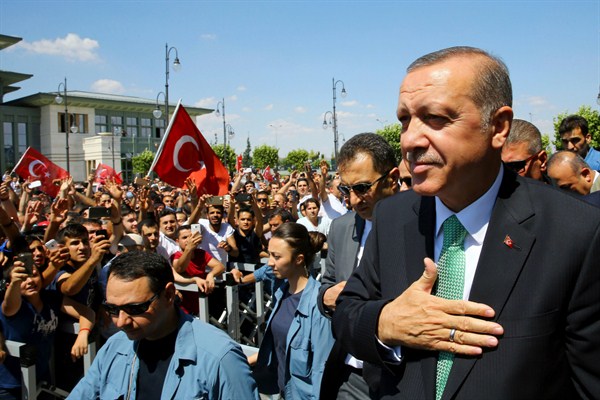The attempted coup d’état earlier this month in Turkey has drawn attention to the leadership of President Recep Tayyip Erdogan and his increasingly authoritarian tendencies. The ensuing crackdown has been replete with widespread purges of major institutions and mass arrests, deepening domestic instability and complicating Turkey’s regional and international outlook. World Politics Review has compiled 10 articles to help contextualize the sources and implications of the current upheaval.
The following 10 articles are free for non-subscribers until Aug. 11.
The Aftermath of the Failed Coup
Failed Coup Is a Victory for Erdogan, but Not for Turkey’s Democracy
By triumphing over an attempt to unseat his democratically elected government, Erdogan technically conquered a threat to Turkish democracy. But his response—a swift and far-reaching crackdown—is a far cry from the ideals associated with democratic societies, Ellen Laipson wrote following the attempted putsch.
As Erdogan’s push toward autocratic rule accelerates, Frida Ghitis noted how a strained U.S.-Turkey relationship has come to the fore. The odds now strongly favor a sharp distancing between Washington and Ankara, and the chances that the deterioration could become much, much worse are steadily growing.
The turmoil in Turkey is yet another headache for the Obama administration’s attempt to stabilize Syria, but the U.S. already seemed to have lost hope that it could ever do so with the help of its problematic allies alone. Instead, the U.S. is doubling down on its attempts to coordinate military efforts in Syria with Russia, a move that has drawn extensive criticism. But, with allies like Turkey, which accused Washington of complicity with the attempted coup, a deal with Moscow might be Washington’s best bet, Richard Gowan argued this month.
Erdogan the Authoritarian
There are important political dividends to be won in Turkey’s war against the PKK, and despite their significant ideological disagreements, both Erdogan and the Turkish military recognize that. Even with that convergence, however, the president’s relationship with the military will inevitably be uneasy moving forward, Iyad Dakka wrote in June.
In June 2015, many Turkey-watchers wrote Erdogan’s political obituary, after his Justice and Development Party lost its parliamentary majority for the first time in 13 years. Though a surprise victory in snap elections held in November put Erdogan back on top, Iyad Dakka stressed at the time that his legacy was hardly assured. While Erdogan’s popular support was—and remains—real, it didn’t give him carte blanche to redesign Turkish political institutions in his own image. Now, the failed coup attempt could give him the excuse he needs to push those changes through.
In the aftermath of the horrific bombings in Ankara last October, the Turkish people and international observers tried to understand what went wrong with Turkey, which until recently embodied the hopes of a more peaceful Middle East. For Frida Ghitis, the answer leads to one man: President Erdogan.
It wasn’t very long ago that Turkey was held up as an example of a country in the midst of a great democratic transformation, Frida Ghitis wrote in April 2015. It was a nation steadily enhancing democratic norms, finding easy coexistence between Islam and democracy, and moving optimistically in the direction of membership in the European Union. But Erdogan’s tightening grip on power and authoritarian quashing of dissent has undercut that vision.
Contested Institutions
Observers have expressed alarm over the scores of journalists detained and the dozens of media organizations and newspapers shuttered by Erdogan’s government since the failed coup. The heightened clampdown in the past few weeks, while worrying, extends from what Nate Schenkkan described in his January article as a long legacy of media repression in Turkey, where restricting the press is ingrained into the country’s political culture. Turkey’s laws are slated against the media, and the Erdogan government has long used them to silence its opponents.
As Erdogan—then prime minister—clashed with Turkey’s judiciary in January 2014, Michael Koplow highlighted the legal system’s fundamental flaw: its politicization. That is on display today; in the aftermath of the coup, Erodgan has issued nearly 200 arrest warrants for members of Turkey’s judiciary. While courts are never completely insulated from politics, Koplow wrote, the perception in Turkey is that the judiciary pursues political aims and is far from being impartial.
Since 1961, civil-military relations in Turkey were characterized by a powerful military with an autonomous influence over politics alongside a weak civilian government. But Turkish civil-military relations normalized over the past decade, Ersel Aydinli observed in April 2013, inching toward a balance more in line with liberal democratic expectations. The government is exercising civilian oversight; the military seems to have accepted its new subordination; and society seems supportive. Still, the balance that had been struck remained an inherently fragile one.

